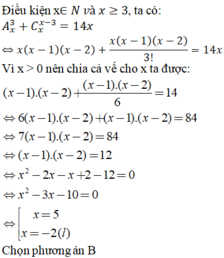

Hãy nhập câu hỏi của bạn vào đây, nếu là tài khoản VIP, bạn sẽ được ưu tiên trả lời.



a: \(5^x=4\)
=>\(x=log_54\)
b: \(5^{2-x}=8\)
=>\(2-x=log_58\)
=>\(x=2-log_58\)
c: \(\left(\dfrac{1}{3}\right)^{x+4}=243\)
=>\(3^{-x-4}=3^5\)
=>-x-4=5
=>-x=9
=>x=-9
d: \(\left(\dfrac{2}{3}\right)^x=\dfrac{3}{2}\)
=>\(\left(\dfrac{2}{3}\right)^x=\left(\dfrac{2}{3}\right)^{-1}\)
=>x=-1

a: \(6^x=5\)
=>\(x=log_65\)
b: \(7^{3-x}=5\)
=>\(3-x=log_75\)
=>\(x=3-log_75\)
c: \(\left(\dfrac{3}{5}\right)^{x-2}=\dfrac{27}{125}\)
=>\(\left(\dfrac{3}{5}\right)^{x-2}=\left(\dfrac{3}{5}\right)^3\)
=>x-2=3
=>x=5
d: \(\left(\dfrac{4}{5}\right)^x=\dfrac{5}{4}\)
=>\(\left(\dfrac{4}{5}\right)^x=\left(\dfrac{4}{5}\right)^{-1}\)
=>x=-1
a.
\(6^x=5\Rightarrow x=log_65\)
b.
\(7^{3-x}=5\Rightarrow3-x=log_75\)
\(\Rightarrow x=3-log_75\)
c.
\(\left(\dfrac{3}{5}\right)^{x-2}=\dfrac{27}{125}\Rightarrow x-2=log_{\dfrac{3}{5}}\left(\dfrac{27}{125}\right)\)
\(\Rightarrow x-2=3\Rightarrow x=5\)
d.
\(\left(\dfrac{4}{5}\right)^x=\dfrac{5}{4}\Rightarrow\left(\dfrac{4}{5}\right)^x=\left(\dfrac{4}{5}\right)^{-1}\)
\(\Rightarrow x=-1\)
Chứng minh rằng các phương trình sau luôn có nghiệm: a)x^5 - 3x+3=0 b)x^5+x-1=0 c)x^4+x^3-3x^2+x+1=0

Lời giải:
a) $f(x)=x^5-3x+3$ liên tục trên $R$
$f(0)=3>0; f(-2)=-23<0\Rightarrow f(0)f(-2)<0$
Do đó pt $f(x)=0$ có ít nhất 1 nghiệm thuộc $(-2;0)$
Nghĩa là pt đã cho luôn có nghiệm.
b) $f(x)=x^5+x-1$ liên tục trên $R$
$f(0)=-1<0; f(1)=1>0\Rightarrow f(0)f(1)<0$
Do đó pt $f(x)=0$ luôn có ít nhất 1 nghiệm thuộc $(0;1)$
Hay pt đã cho luôn có nghiệm.
c) $f(x)=x^4+x^3-3x^2+x+1$ liên tục trên $R$
$f(0)=1>0; f(-1)=-3<0\Rightarrow f(0)f(-1)<0$
$\Rightarrow f(x)=0$ luôn có ít nhất 1 nghiệm thuộc $(-1;0)$
Hay pt đã cho luôn có nghiệm.

a.
\(2^x=2^{3x-1}\Leftrightarrow x=3x-1\)
\(\Rightarrow x=\dfrac{1}{2}\)
b.
\(7^{x-5}=49\Leftrightarrow x-5=log_749=2\)
\(\Rightarrow x=7\)
c.
\(3^{5x-3}=1\Rightarrow5x-3=log_31=0\)
\(\Rightarrow x=\dfrac{3}{5}\)
d.
\(\left(\dfrac{1}{7}\right)^{5x}=7^{x+6}\Leftrightarrow7^{-5x}=7^{x+6}\)
\(\Leftrightarrow-5x=x+6\)
\(\Rightarrow x=-1\)

a.
ĐKXĐ: \(x\ge3\)
(Tốt nhất bạn kiểm tra lại đề cái căn đầu tiên của \(\sqrt{x-3}\) là căn bậc 2 hay căn bậc 3). Vì nhìn ĐKXĐ thì thấy căn bậc 2 là không hợp lý rồi đó
Pt tương đương:
\(\sqrt{x-3}+\sqrt[3]{x^2+1}+\left(x+1\right)\left(x-2\right)=0\)
Do \(x\ge3\Rightarrow x-2>0\Rightarrow\left(x+1\right)\left(x-2\right)>0\)
\(\Rightarrow\sqrt{x-3}+\sqrt[3]{x^2+1}+\left(x+1\right)\left(x-2\right)>0\)
Pt vô nghiệm
b.
ĐKXĐ: \(x\ge-\dfrac{3}{2}\)
Pt: \(2x+3-\sqrt{2x+3}-\left(4x^2-6x+2\right)=0\)
Đặt \(\sqrt{2x+3}=t\ge0\) ta được:
\(t^2-t-\left(4x^2-6x+2\right)=0\)
\(\Delta=1+4\left(4x^2-6x+2\right)=\left(4x-3\right)^2\)
\(\Rightarrow\left[{}\begin{matrix}t_1=\dfrac{1+4x-3}{2}=2x-1\\t_2=\dfrac{1-4x+3}{2}=2-2x\end{matrix}\right.\)
\(\Leftrightarrow\left[{}\begin{matrix}\sqrt{2x+3}=2x-1\left(x\ge\dfrac{1}{2}\right)\\\sqrt{2x+3}=2-2x\left(x\le1\right)\end{matrix}\right.\)
\(\Leftrightarrow\left[{}\begin{matrix}2x+3=4x^2-4x+1\left(x\ge\dfrac{1}{2}\right)\\2x+3=4x^2-8x+4\left(x\le1\right)\end{matrix}\right.\)
\(\Leftrightarrow\left[{}\begin{matrix}x=\dfrac{3+\sqrt{17}}{4}\\x=\dfrac{5-\sqrt{21}}{4}\end{matrix}\right.\)

\(a,3^{x-1}=27\\ \Leftrightarrow3^{x-1}=3^3\\ \Leftrightarrow x-1=3\\ \Leftrightarrow x=4\\ b,100^{2x^2-3}=0,1^{2x^2-18}\\ \Leftrightarrow10^{4x^2-6}=10^{-2x^2+18}\\ \Leftrightarrow4x^2-6=-2x^2+18\\ \Leftrightarrow6x^2=24\\ \Leftrightarrow x^2=4\\ \Leftrightarrow x=\pm2\)
\(c,\sqrt{3}e^{3x}=1\\ \Leftrightarrow e^{3x}=\dfrac{1}{\sqrt{3}}\\ \Leftrightarrow3x=ln\left(\dfrac{1}{\sqrt{3}}\right)\\ \Leftrightarrow x=\dfrac{1}{3}ln\left(\dfrac{1}{\sqrt{3}}\right)\)
\(d,5^x=3^{2x-1}\\ \Leftrightarrow2x-1=log_35^x\\ \Leftrightarrow2x-1-xlog_35=0\\ \Leftrightarrow x\left(2-log_35\right)=1\\ \Leftrightarrow x=\dfrac{1}{2-log_35}\)